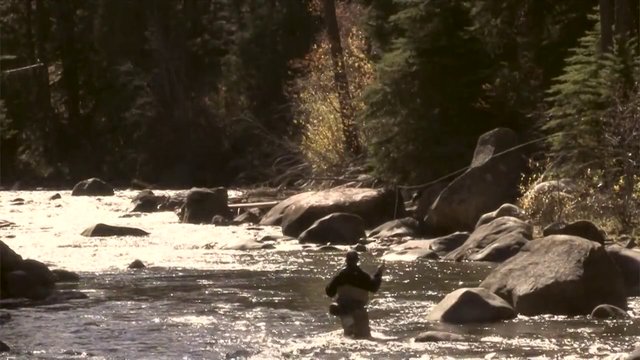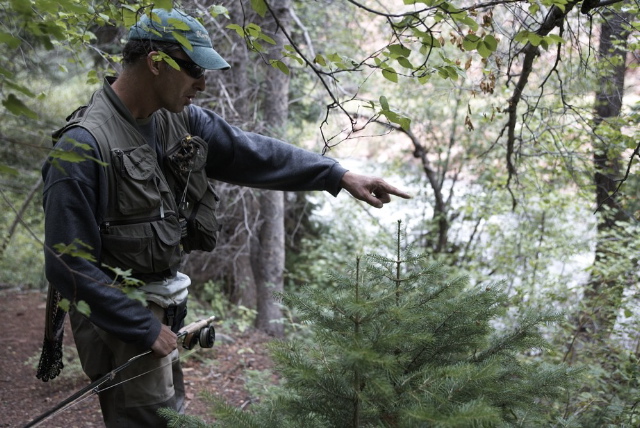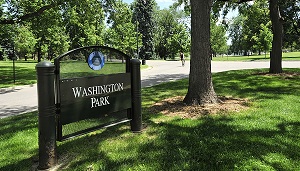Aspen. The mere whispering of the word congers up images of Paris Hilton, Man-Furs, Range Rovers and million dollar homes. And for the most part, that would be 100 % accurate. But Aspen, like any mountain resort town, is also filled with mountains and rivers that provide great outdoor activities. Many wealthy people enjoy that – as a matter of fact, most people enjoy that. Unfortunately, that “access” to the great outdoors, indirectly costs money.
You have to find a creative way to live in one of the most expensive places in the U.S.. Common sense told me that since I loved the outdoors and mastering legendary trout waters like the Frying Pan, Roaring Fork and the Colorado, becoming a professional fly fishing guide for a living was an obvious choice. But we guides are dealt a difficult set of cards.
First card: Getting on the shop roster is not always an easy task, even if you do happen to be one of the best anglers in the valley. I have been a guide with Taylor Creek Fly Shop in Basalt for the last 18+ years and I only landed it because a) I got a good referral from a buddy that was a guide there, b) I spent so much money there on new rods, flies and every other thing I needed to “fish properly” (besides, I felt it gave me a bit of credibility) and c) I was able to “talk the talk” and “walk the walk”.
Second card: You need money both for a place to live and so you can eat. This lifestyle can be especially difficult if you are on the bottom of the guide ladder. It’s only when the senior guides are not available when you get the trip. Being the low man on the totem pole, you have to hope for a last minute booked trip or wait by the phone all day hoping you’re next on the list to call. The lack of consistent last minute trips or senior guides calling in sick or being on vacation, can lead to financial stress and inconsistent diet. The only known consistency for a guide is understanding that the last minute bookers are not typically the seasoned fishermen you hope for. And chances are, these people will have recently watched “The Movie” and now they want their spoiled 5 year old daughter and disinterested 14 year old son to experience what catching a 20 inch rainbow is like – “just like the one Brad Pitt caught in A River Runs Through It” while yelling across the river, “You haven’t caught one yet?” only ten minutes after hitting the water.
But I digress. What I am trying to say is that guides need money. So I’d like to share with you my ten survival tips on how to live, eat and breathe fly fishing as a professional guide when you are broke and have to make it in an expensive area.
Tip # 1: Be nice, polite and humble. Nothing will keep you from getting trips or moving up the ranks more than arrogance. Chances are, you are not the greatest fisherman alive and you didn’t really “land a hundred” or “get the biggest cut-bow in the Pan”. The fact is, the guides in “real” fly shops are ALL great fisherman. The best thing you can do is go fishing with the senior guides and prove you know how to fish. But most importantly, be cool about it! This will pay off in spades. You are more likely to be the first one asked to accompany the senior guide on group trips. That equals no bottom of the totem pole which means more money.
Tip #2: Top Ramen is not all that bad. Really. Throw in some fresh vegetables and soy sauce and you’re golden.
Tip #3: Having a truck is helpful. It provides a comfortable ride for your clients as well as a great place to sleep. The forest service provides camp areas for up to 10 days or more. Not only is it a practical mode of transportation and lodging, but that it just makes for a good story when you decide to give up guiding in order to finally use your Political Science degree.
Tip # 4: Beer is not food. Once you get a couple of trips and you make your first tip above and beyond your guide fee, try not to turn that extra money into a series of cocktails for the boys. You need that money. It won’t be there in a few months. (Note to the veteran guides: hang around the new guides, they’re rookie enough to always be buying! By doing so, you can keep your tips.)
Tip #5: Network and always carry business cards. This is a must. Anybody on the river that isn’t already a fishing guide, wants to be. That instantly makes you the most envied and the coolest person they know. Use that to your advantage. Your perceived coolness, especially if you make the client think they caught that brown all on their own, equated to referrals, shop status and money. Don’t be a slacker trout bum, it’s still abusiness. Always be selling (yourself)!
Tip #6: Remember, the rich are different. Embrace it. It is likely that a fleet of Range Rovers show up and they all step out with enough gear to stock a new shop. That doesn’t mean a thing. The fish don’t care and nor should you. They’re people – just like you (but with a lot more money). There’s no need to suck up. Treat them like you want to be treated and, trust me, you will be rewarded by either a great tip or a new regular repeat client.
Tip# 7: Practice the three “T’s” – Teach, Therapy, and Tolerance. Being a great guide is not how good of a fisherman you are (although it helps), it’s more about how well you understand your client. I did a trip one year with a client that I had guided a few times before. This trip she wanted to fish a little bit, but what she really wanted to do was to learn how to drive a stick shift. So our day was planned out where we fished for an hour, teach her how to drive my stick shifted-car for three hours, then fish again for an hour. She was a client for years. She booked consistently and always tipped well but what I found the most rewarding was never knowing exactly what we were going to do the day I was fishing with her.
Tip#8: Don’t sleep with any of your clients (see fishing above). Nothing good can come from this. Worst of all, you have turned a paying client into a non-paying client with “benefits”. And if it turns bad, like it always will, and their husband or wife finds out, there goes all of their referred client friends and any potential for new referrals from them.
Tip# 9: Have another skill. It can be anything from tuning skis to bartending to instructing snowboarders to practicing law. Also, being a trust funder, salt-water fly guide, or a chef, will work. It is not only important to have a plan, but as a fly guide in a touristic, seasonal, resort destination, with unpredictable run-off and conditions, you must also have a Plan B, and C all the way up to Z. Sure, some people can and do make it as a full time guide, but only if you are willing to budget. Unfortunately, most guides are fiscally inept and easily led astray by being surrounded by pro-deals and new gear in the shop – there is always that new reel or new 9-weight rod you might need for that Christmas Island trip you’ve been saving up for. This one I know from experience.
Tip # 10: If you really love fly-fishing, you love the river and everything it offers. Remember that you weren’t born an expert fly fisherman and your clients want to learn from you. You’re on the right path. It’s not hard to survive if you’re smart about it.
So if your ambition is to become a wealthy, full-time fly fishing guide, traveling around the globe and living the lifestyle, go for it. The fact is, I live that life style. I may not wear Man-Fur or have enough money to date Paris Hilton, but I am rich in experience and I have made a bank load of friends. The only cash I have is a CD in my truck of Johnny Cash, Folsom Prison Blues. To tell you the truth, I wouldn’t change a thing.
Glenn Smith







